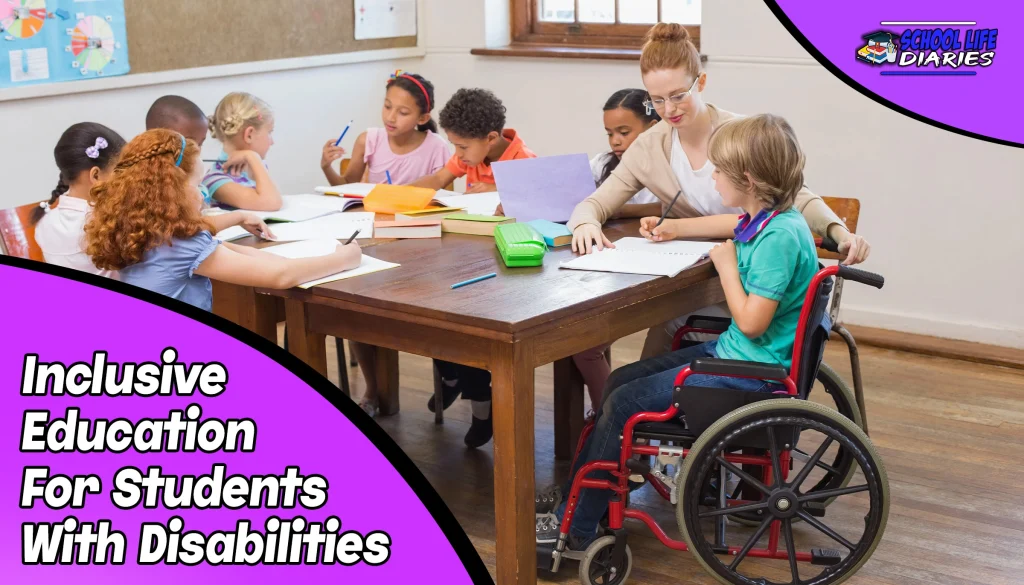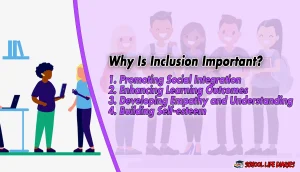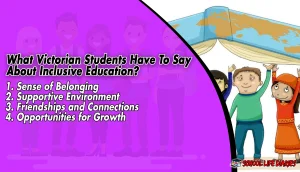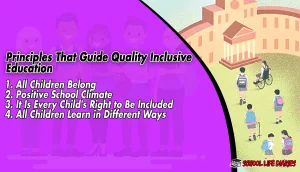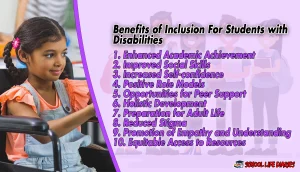Inclusive education is a transformative approach that aims to provide equal educational opportunities for students with disabilities. It promotes diversity, fosters empathy, and ensures that every child feels valued and included in the learning environment.
In this article, we will explore the concept of inclusive education, understand its importance, hear the perspectives of Victorian students, and examine UNICEF’s work in promoting inclusive education.
We will also delve into the principles that guide quality inclusive education and discuss the numerous benefits it offers for students with disabilities as well as those without disabilities.
What Is Inclusive Education?
Inclusive education refers to the practice of educating students with disabilities in regular classrooms alongside their non-disabled peers. It emphasizes the removal of barriers to learning and participation, ensuring that all students have access to the same educational opportunities. Inclusive education recognizes and values the diverse needs, abilities, and strengths of students, promoting an environment of respect, acceptance, and collaboration.
Why Is Inclusion Important?
Inclusion is vital for fostering a society that upholds equality and diversity. Here are some key reasons why inclusion is important in education:
1. Promoting Social Integration:
Inclusive education encourages social interaction and friendships between students with and without disabilities, breaking down barriers and reducing stigma.
2. Enhancing Learning Outcomes:
Students with disabilities benefit from the diverse instructional strategies and resources available in inclusive classrooms, leading to improved academic achievements.
3. Developing Empathy and Understanding:
Inclusive education nurtures empathy, compassion, and understanding among students, fostering a more inclusive and accepting society.
4. Building Self-esteem:
Inclusion provides students with disabilities the opportunity to develop a positive self-image, build self-confidence, and realize their potential.
What Victorian Students Have To Say About Inclusive Education?
When we asked Victorian students about their experiences with inclusive education, their responses were overwhelmingly positive. They highlighted the following aspects:
1. Sense of Belonging:
Students expressed how inclusive education made them feel accepted, valued, and part of a supportive community.
2. Supportive Environment:
Students appreciated the support they received from teachers and peers, enabling them to overcome challenges and succeed academically and socially.
3. Friendships and Connections:
Inclusive education fostered meaningful friendships and connections with classmates, promoting a sense of camaraderie and shared experiences.
4. Opportunities for Growth:
Students acknowledged that inclusive education provided them with opportunities to develop their skills, talents, and independence.
Is UNICEF’s Work Promoting Inclusive Education?
UNICEF recognizes the importance of inclusive education in ensuring the rights of every child. They actively work towards promoting inclusive education globally through various initiatives. UNICEF focuses on:
1. Advocacy and Policy:
UNICEF advocates for policies and frameworks that support inclusive education and encourage governments to invest in inclusive practices.
2. Teacher Training:
UNICEF provides training and support to teachers to equip them with the knowledge and skills necessary for inclusive classrooms.
3. Accessible Learning Materials:
UNICEF develops and distributes accessible learning materials to ensure that all students can engage effectively in the learning process.
4. Community Engagement:
UNICEF works with communities to raise awareness, reduce discrimination, and foster a culture of inclusion in schools and society.
Principles That Guide Quality Inclusive Education
To ensure quality inclusive education, several principles serve as guiding pillars. These principles include:
1. All Children Belong:
Every child, regardless of their abilities or background, has the right to be included and participate in mainstream education.
2. Positive School Climate:
Schools should foster a positive and supportive climate that embraces diversity, promotes acceptance, and celebrates the strengths of all students.
3. It Is Every Child’s Right to Be Included:
Inclusive education is a fundamental right, and schools must adopt inclusive practices to ensure equal opportunities for all.
4. All Children Learn in Different Ways:
Inclusive education acknowledges the diverse learning styles and needs of students, providing tailored support and accommodations as required.
Benefits of Inclusion For Students with Disabilities
Inclusive education offers numerous benefits for students with disabilities. Here are ten key advantages:
1. Enhanced Academic Achievement:
Students with disabilities thrive academically in inclusive classrooms, benefiting from the differentiated instruction and specialized support available.
2. Improved Social Skills:
Inclusive education provides ample opportunities for students with disabilities to interact and develop social skills through meaningful relationships with peers.
3. Increased Self-confidence:
Being included in regular classrooms boosts self-confidence and self-esteem, empowering students with disabilities to believe in their abilities.
4. Positive Role Models:
Students with disabilities benefit from observing and learning from their non-disabled peers, providing positive role models for behavior and academic success.
5. Opportunities for Peer Support:
Inclusive classrooms foster an environment where students support and help one another, creating a strong sense of community.
6. Holistic Development:
Inclusive education promotes the holistic development of students, ensuring that their emotional, social, and cognitive needs are met.
7. Preparation for Adult Life:
Inclusive education equips students with disabilities with the necessary skills and experiences to navigate real-world situations and become independent adults.
8. Reduced Stigma:
Inclusive classrooms break down stereotypes and reduce the stigma associated with disabilities, promoting a more inclusive and accepting society.
9. Promotion of Empathy and Understanding:
Students without disabilities develop empathy and understanding by interacting with and learning alongside their peers with disabilities.
10. Equitable Access to Resources:
Inclusive education ensures that students with disabilities have equal access to resources, technology, and support services, promoting fairness and equity.
Benefits of Inclusion For Students Without Disabilities
Inclusive education is not only beneficial for students with disabilities but also for those without disabilities. Here are ten advantages that students without disabilities experience in inclusive classrooms:
1. Enhanced Empathy and Understanding:
Interacting with students with disabilities fosters empathy, understanding, and acceptance among their non-disabled peers.
2. Diverse Perspectives:
Inclusive classrooms offer a rich tapestry of perspectives, fostering creativity, critical thinking, and broader worldviews.
3. Academic Growth:
Students without disabilities benefit from peer-assisted learning and the collaborative problem-solving approach often seen in inclusive classrooms.
4. Lifelong Friendships:
Inclusive education enables students without disabilities to form meaningful and lasting friendships with individuals of diverse abilities.
5. Preparation for the Real World:
Inclusive classrooms mirror the diversity present in society, preparing students without disabilities for life beyond school.
6. Enhanced Social Skills:
Students without disabilities develop valuable social skills, including empathy, patience, and communication, by interacting with peers of different abilities.
7. Reduced Prejudice and Bias:
Inclusive education challenges stereotypes, biases, and prejudices, promoting a more inclusive and accepting society.
8. Celebration of Differences:
Students without disabilities learn to appreciate and celebrate differences, fostering a culture of inclusion and respect.
9. Improved Problem-Solving Abilities:
Collaborating with peers of diverse abilities enhances students’ problem-solving abilities and creativity.
10. Preparation for Leadership:
Inclusive classrooms provide opportunities for students without disabilities to develop leadership skills by supporting and advocating for their peers with disabilities.
FAQs:
Q: What legal rights protect inclusive education for students with disabilities?
A: Inclusive education is protected by laws such as the Individuals with Disabilities Education Act (IDEA) in the United States and the Equality Act in the United Kingdom, which ensure equal access to education for students with disabilities.
Q: How can parents support inclusive education for their children with disabilities?
A: Parents can actively engage with schools, communicate their child’s needs, collaborate with teachers, and advocate for inclusive practices. They can also seek support from advocacy groups and connect with other parents in similar situations.
Q: Are there any challenges associated with implementing inclusive education?
A: While inclusive education offers numerous benefits, challenges can include the need for specialized support and accommodations, ensuring adequate teacher training, and addressing attitudinal barriers and stigmas.
Q: How can schools create a positive and inclusive climate for all students?
A: Schools can promote inclusivity by implementing anti-bullying policies, fostering a culture of respect and acceptance, providing professional development for teachers, and encouraging student-led initiatives that celebrate diversity.
Q: Can inclusive education benefit students with severe disabilities?
A: Yes, inclusive education can benefit students with severe disabilities by providing them with opportunities for social interaction, personalized support, and access to the general education curriculum.
Q: How does inclusive education align with the principles of Universal Design for Learning (UDL)?
A: Inclusive education and UDL share a common goal of providing multiple means of representation, engagement, and expression to accommodate the diverse needs of all learners.
Conclusion:
Inclusive education is a transformative approach that values and embraces the diversity of all students. It provides students with disabilities equal opportunities, fosters a sense of belonging, and prepares them for success in school and beyond. Inclusive education not only benefits students with disabilities but also enhances the educational experiences of their non-disabled peers, promoting empathy, understanding, and a more inclusive society.
By prioritizing the principles of inclusive education, advocating for inclusive policies, and fostering collaboration among various stakeholders, we can create educational environments where every child thrives and realizes their full potential. Inclusive education is a powerful force that promotes equality, diversity, and empathy within educational settings.

